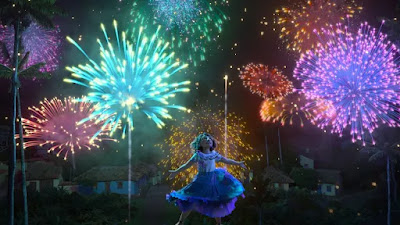Encanto is an atypical Disney animated musical. Sure, it has the twirling and singing and magic and cute kids and animal sidekicks. But it’s also curiously interior—literally and psychologically—concerning itself mostly with feelings of anxiety and insecurity among the enchanted family nestled safe, but not so sound, in a fantastical house in a small Colombian village. The usual Disney lively likable misfit protagonist is middle daughter Mirabel (Stephanie Beatriz), a plucky, curly-haired, bespectacled do-gooder who feels left out of the family specialness, since she’s the only one who wasn’t bestowed a magical power. The grandmother matriarch presides over their home with a glowing miracle candle gifted her out of the ether upon the death of her husband at the hands of marauders fifty years prior. Since then it’s filled their home with sentient floors and banisters, cupboards, counters, and stairs. And every other member has a gift to share—super-hearing, power-lifting, shape-shifting, plant-sprouting, medicinal cooking, weather-controlling, animal-talking, prophesying.
The plot of the movie concerns Mirabel’s attempts to make herself valuable to the family by saving their flickering flame, suddenly vulnerable for the first time in decades. To do so, she’ll need to grapple with discovering various family member’s own insecurities, and learns along the way that she’s not the only one who feels pressure to live up to the family name and expectations that come with it. Each song, provided by Lin-Manuel Miranda with his usual rat-a-tat wordplay and love of rhyming rounds and recurring motifs, returns to this theme, with several characters given numbers that express their internal struggles, and a few group numbers full of family gossip about others’. This is strangely rocky territory for a bustling, busy animated musical—at once cramped and complicated—and it never really takes off like a Moana or Frozen. But what it has in spades is personality, bursting to the seams with side characters and flowing with seemingly authentic Columbian style—food and language and clothes and flowers exploding in colorful flourishes. It’s a thoroughly well-intentioned picture.

is a far different animated experience in form and content—although, oddly enough, it treads some similar thematic grounds. It’s a story of a family threading to be splintered, and yet bound together by love. It’s about generational trauma, how good fortune in the face of long odds can become the root of insecurity. This one happens to be true. It’s a documentary animated out of necessity as it’s the testimony of an Afghan refugee who wished to remain anonymous. Because he’s an old friend of director Jonas Poher Rasmussen, he’s willing to give his testimony to the project. Provided the name Amin for the purposes of this film, he narrates the story of his happy early years in Afghanistan, and the sorrowful reasons his family decided to leave their homeland for Europe. Amin details a harrowing journey of a displaced child sent off from the only place he knew, tossed into the unknown. It gets all the more isolating when the family is splintered out of the necessities of various border crossings and asylum claims. Eventually he ends up a young person alone in Denmark, carrying so many painful memories and secrets that must be kept to ensure he stays and survives in this new country.
Rasmussen sketches out the details by guiding in lovely, spare hand-drawn animation—fluid and simple, with soft colors, precise personal details, and evocative gestures—that conjures the gentle spirit and sensitive memories of his subject. The conversation on the audio stays at a relative even-keel, with Amin’s soft-spoken precision, and some subtle stumbling over the most difficult moments, carrying the narrative along. As he grows into himself, the journey of self-discovery is not only a refugee’s double-consciousness, but as a budding intellectual, and a gay man, he’s filled with reasons to feel apart from the others. Rasumussen helps to bring these complications to a full flowering, and the film becomes less a catalogue of struggles, and more a tribute to his friend’s resilience. Here’s a loving portrait of man’s ability to bloom where you’re planted, and to find strength in the very roots that might also be the source of one’s regrets and anxieties.



No comments:
Post a Comment